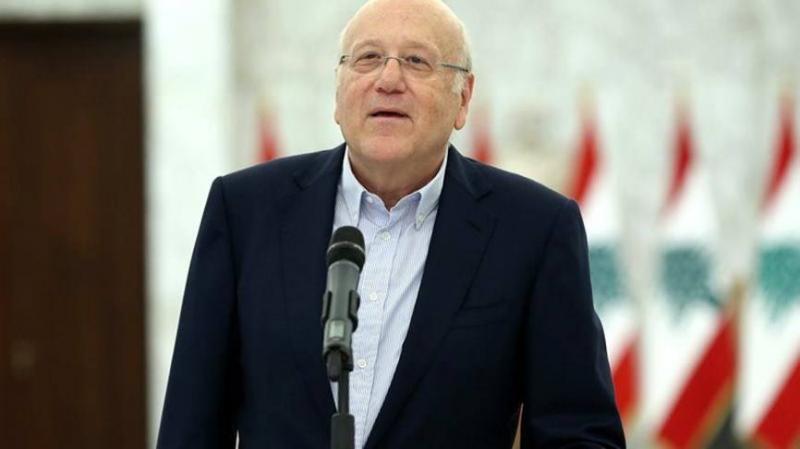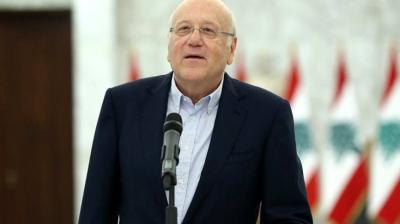The newspaper "Asharq Al-Awsat" reported that Lebanese Prime Minister Najib Mikati considered the statements issued by Saudi Arabia and Kuwait expressing hope for Lebanon to regain its Arab role as an indication that the "cloud" hanging over Lebanon's relations may soon dissipate. Mikati emphasized the importance of implementing the ministerial statement during a government session he chaired yesterday, calling on Arab countries to support Lebanon, affirming that "the ties between Lebanon and its Gulf brothers are based on a shared history and a belief in a common destiny."
This came at a time when the statements from Saudi Arabia and Kuwait were welcomed in Lebanon, with political parties seeing them as a new opportunity to restore normal relations with Gulf countries. Ministerial sources anticipated that the upcoming phase would bring practical steps in this direction, revealing that Mikati might soon visit Arab countries.
The Saudi Foreign Ministry expressed its welcome on Twitter for the "positive points" included in Mikati's statement, hoping that "this would contribute to restoring Lebanon's role and position regionally and internationally." They affirmed, "The Kingdom looks forward to peace and security in Lebanon, and for the Lebanese people to enjoy stability, security, growth, and prosperity." Similarly, Kuwait welcomed Mikati's statement, which reaffirmed the government's commitment to restoring relations between Lebanon and the Gulf Cooperation Council countries.
Sources from the presidency told "Asharq Al-Awsat" that "the presidency is pleased with the positive reactions from Arab countries, as this was the goal of President Aoun." They noted that any positive signal from the Gulf is welcome and reiterated Aoun’s commitment to maintaining the best relations with the Gulf and Arab countries during the visit of Arab League Secretary-General Ahmed Aboul Gheit the previous week.
Regarding Lebanon's role in this context, sources stated: "Lebanon has done what it could regarding crime and smuggling, but there are some issues that were frankly addressed with the Arabs, referring to the role of Hezbollah, which lies within a broader regional framework rather than a local one. Addressing these issues requires Arab and international efforts, not just Lebanese responsibility." The sources indicated that discussions between Aoun and Mikati continue to translate practical steps quickly.
In this context, MP Wael Abou Faour from the Democratic Gathering, who is visiting Riyadh to engage with Gulf countries, noted that "they built upon the Kuwaiti initiative to mend relations and the Lebanese calls to heal the rift, especially the stance of Prime Minister Mikati, in addition to the French role. All these factors contributed to achieving this positive outcome," announcing that "the return of the Saudi and Kuwaiti ambassadors is forthcoming, and any positive actions from Lebanon will be met with greater positivity from the Gulf countries."
Abou Faour highlighted in a discussion with the "Anbaa" electronic newspaper, affiliated with the Progressive Socialist Party, that "his meeting with Saudi officials addressed joint arrangements with the French to support social institutions, the possibility of Saudi participation in the international fund to support the Lebanese army and security forces, and steps to restore relations to normalcy and ways to develop them." He considered that "the return of the Arabs to Lebanon represents the only political and economic lifeline, and the ball is in our court as Lebanese to do what is necessary to encourage our Arab brothers to provide further actions."
MP Nimt Taameh appreciated "the statements issued by the Saudi and Kuwaiti foreign ministries," stating: "I was not surprised by Saudi Arabia's stance and its humanitarian support for Lebanon, nor by the expected return of its ambassador to Lebanon, Walid Bukhari, due to my strong knowledge of the noble and chivalrous leadership of the Kingdom." He added, "I have indicated several times that Saudi officials love Lebanon more than some of its officials," considering that the emerging positives could establish more political and economic indicators for overcoming the dilemmas we face, given Saudi Arabia's influential role in Lebanon on all levels.
Taameh emphasized, "The return of Saudi Arabia and the Gulf to Lebanon is a good deed for a country struggling under the heavy burdens of economic, living, and social crises that its people face due to the absence and deterioration of the state and its institutions." He affirmed that "Saudi Arabia will not abandon Lebanon, hoping to halt anything that might harm it or our people in the Gulf, as they have always stood by us in difficult times, not differentiating between one Lebanese or another, or between this sect or that."




